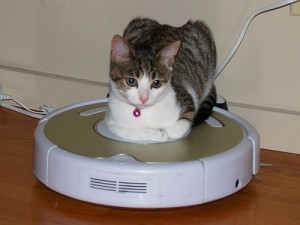ROCM: Representation, Organisation, Classification, and Meaning-Making was a required class when I did my Master of Information. At the time, I complained incessently about how useless it was, how I was never going to use any of it in real life… Well, I was wrong.

Despite being sat upon in the kitchen, this is probably not a kitchen chair. Credit: barbostick
Yesterday morning, I spent about four hours thinking about ROCM as I reorganized MongoDB’s operators page. One of our professors had a tendency to ask “What makes a kitchen chair a kitchen chair? Is any chair in a kitchen a kitchen chair? Is anything you sit on? If you sat on your dog while he’s in the kitchen, is he a kitchen chair? If you carry a chair that’s usually in your kitchen into the living room, is it still a ‘kitchen chair’?”, etc. The “kitchen chair” metaphor became something of a meme among my cohort, one which inevitably gets brought up whenever we’re together. The crux of the kitchen chair debate is the question of what makes stuff fit into the categories it fits into. This is really the issue that anyone involved in classification or organization has to grapple with, hopefully with the knowledge that no solution is perfect, but some are better than others.
This week, the question was “What makes these MongoDB operators fit together?”. Some groupings were obvious: the ‘Logical’ operators (‘or’, ‘and’, ‘not’, and ‘nor’) go together nicely. Same with the operators related to geospatial queries, and those specific to arrays. My problem was what’s left: the operators we’ve now classified as ‘Comparison’, ‘Element’, or ‘Evaluation’. In a sense, the ‘Element’ category is ridiculous: by their nature, queries involve elements… for that matter, all queries involve comparison so the ‘Comparison’ category is a bit fraught as well. But what’s an IA-minded technical writer to do? Either give up and put them all in one long, awful list (which is unideal), or categorize as best you can, knowing that it won’t be perfect (also unideal). Clearly, I went with the latter.
I think the categories we settled on will be meaningful for our readers, while also being factually accurate, which is really the goal. The fact that there’s some weirdness is unfortunate, but sadly unavoidable.
The inevitable failure of classification systems is a central theme of Geoffrey Bowker and Susan Leigh Star’s Sorting Things Out: Classification and Its Consequences. Bowker and Star’s examples really highlight the power of classification: they discuss tuberculosis patients, and the ways that wishy washy diagnoses ruined peoples lives; talk about the incredibly inconsistent and damaging categorization of people under Apartheid in South Africa, and discuss nursing interventions classification and its impact on both nurses’ and patients’ lives. Sorting Things Out is one of those texts that I cited in (nearly) every paper I wrote during my MI, because it always applied. At its core, the book is about highlighting the ways that classification is – or becomes – invisible, and how people grow to accept categories as natural. As people who care about the ways that we structure information, recognizing the theory behind classification and its implications can make us better at determining an ideal structure for our use case, and at recognizing the ways that it might fail.
Sorting Things Out is on sale at Amazon right now, for under $20. I paid about $50 when I bought my copy, so now’s a good time to bone up. It’s a great read that has instilled in me the need to regard existing classification systems with a critical eye rather than accepting them at face value, and to be far more thoughtful when creating my own.